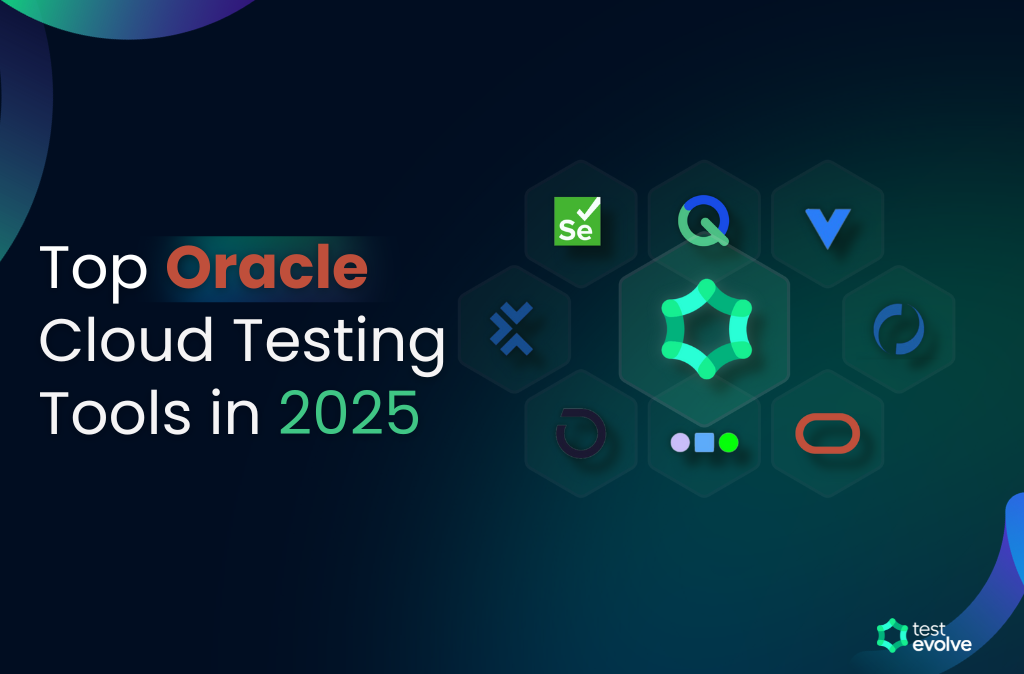Top 9 Oracle Cloud Testing Tools Every Tester Should Try in 2025
Testing Oracle applications requires continuous adaptation to evolving platform requirements.
Oracle Cloud pushes scheduled updates across its suite (Fusion, HCM, ERP, SCM) every quarter. These updates aren’t optional, and minor changes in layout or logic can affect core business processes.
If your team is working with custom workflows, third-party integrations, or migrating from EBS to Cloud, even a small update can break automated tests or interrupt business-critical flows like approvals, onboarding, or procurement.
These changes often have cascading effects, where modifications in one module can impact functionality in related modules.
Not every test automation tool can handle Oracle’s dynamic UI elements, custom user roles, or region-specific workflows, resulting in test failures that require ongoing maintenance across multiple releases.
In this blog, we’ll look at 9 Oracle cloud testing tools that are designed to handle these patterns, helping teams manage quarterly updates, cover regression risk, and maintain test suites without starting over each time.
Top 9 Oracle Cloud Testing Tools in 2025
Choosing the right tool for Oracle testing comes down to how well it handles the realities of your setup.
Quarterly cloud updates, complex cross-module dependencies, and the move from EBS to Fusion demand tools that can keep up without reactive troubleshooting.
The 9 tools below stand out in 2025 for how they support Oracle Cloud testing, whether you're looking for no-code test creation, deep customisation, or tighter CI/CD workflows.
Each one is built to handle the challenges that come with Oracle’s scale, pace, and complexity.
#1 Selenium
Selenium remains the go-to open-source framework for teams needing complete control over their test automation stack. While not tailored specifically for Oracle, it’s widely used by advanced teams for custom Oracle cloud testing setups.
Key Features:
Full code-based control using Java, Python, JS, and more.
Cross-browser and cross-platform support.
Supports integration with test runners, CI/CD pipelines.
Extensive community and plugin ecosystem.
Ideal for building reusable component-level tests.
Best For
QA teams with strong development skills who prefer building custom tests in-house. Selenium works well when you need fine control over Oracle cloud testing and want to integrate it with a wider automation framework.
#2 Tricentis
An enterprise-grade platform known for its model-based automation, Tricentis offers robust support for Oracle and other complex enterprise ecosystems. Its integration of performance, data, and service virtualisation makes it ideal for comprehensive testing needs.
Key Features:
Model-based test creation for high scalability.
Built-in performance and API testing capabilities.
SAP and Oracle integrations for end-to-end coverage.
AI-driven test maintenance and impact analysis.
Supports CI/CD pipelines with native plugins.
Best For
Large enterprises managing Oracle Cloud testing with other complex systems. Particularly useful in regulated industries, teams with large test suites, or environments with multiple technologies.
#3 Test Evolve
Built for Agile and CI/CD workflows, Test Evolve offers a modern automation platform tailored for dynamic Oracle environments. It supports UI, API, and end-to-end testing with seamless pipeline integration.
Key Features:
Agile-native with in-sprint automation capabilities.
Supports Redwood UI, responsive layouts, and dynamic components.
Powerful visual test debugging and self-healing scripts.
Native integration with GitHub, Jenkins, and Azure DevOps.
Test case versioning for stable and auditable change tracking.
Best For
Teams who want to speed up Oracle release cycles, notably in hybrid setups. Works well when testing needs to happen inside sprints, with quick feedback loops and CI/CD pipeline integration.
#4 Virtuoso
Virtuoso combines low-code simplicity with AI-powered capabilities to accelerate test authoring and reduce maintenance overhead. Its visual interface is ideal for functional teams working across Oracle modules.
Key Features:
AI-driven test creation and self-healing locators.
Supports Redwood UI and dynamic content.
Visual scripting with natural language inputs.
Cross-browser and responsive testing.
Smart scheduling and parallel execution.
Best For
Teams looking to scale Oracle Cloud testing without heavy scripting. Specifically helpful when functional users need to take part in designing and maintaining tests directly.
#5 ACCELQ
ACCELQ brings continuous test automation to Oracle environments without the overhead of heavy scripting. Built for Agile and DevOps teams, it tackles the moving parts of Oracle with ease, from frequent patches to evolving user roles.
Key Features:
Test dependency mapping to handle complex Oracle workflows.
Self-healing and autonomous script updates.
Real-time collaboration across QA, Dev, and Business.
Works across web, API, and packaged apps.
Cloud-based with CI/CD integrations.
Best For:
Great for mid-to-large enterprises that want to embed Oracle application testing into their delivery pipelines without adding any tool complexity or overhead.
#6 Leapwork
Leapwork is a no-code automation platform designed to make test creation accessible to both technical and non-technical users. Its visual approach is especially useful for testing Oracle systems with dynamic interfaces and modular workflows.
Key Features:
Drag-and-drop test design with flowcharts.
Cross-platform support including Oracle, web, and desktop.
Built-in test debugging and live execution.
Scalable execution on local or cloud agents.
Reusable components for faster updates.
Best For
Teams who are looking to expand Oracle cloud testing across both business and QA users without needing deep coding skills.
#7 Worksoft
Worksoft is a process-focused test automation platform built for complex ERP environments, including Oracle Cloud. It prioritises end-to-end validation of business processes across systems, ensuring that automation aligns with how real users interact with enterprise software.
Key Features:
Scriptless automation with process capture.
Supports Oracle, SAP, Salesforce, and more.
Business process documentation and audit trails.
Integration with CI/CD and ALM tools.
Scalable testing across platforms and environments.
Best For
Enterprises in regulated industries or with complex cross-system workflows. Worksoft is a good choice for teams that need Oracle cloud testing tools to validate full business processes.
#8 Opkey
A no-code, AI-powered platform built specifically for ERP testing, Opkey is Oracle-certified and widely used across industries for automating updates and business processes. It supports both cloud and on-premise Oracle applications with minimal technical overhead.
Key Features:
7,000+ prebuilt test cases for Oracle apps, including Fusion and EBS.
One-click automation for quarterly patch validations.
AI-powered test discovery and self-healing.
Business user-friendly interface with no-code authoring.
End-to-end testing across web, mobile, API, and ERP systems.
Best For
Enterprises that need fast, repeatable testing across Oracle Cloud and Oracle E-Business Suite, especially those dealing with regular patch updates or strict change control processes.
#9 Oracle Flow Builder
Oracle Flow Builder (OFB) is a keyword-driven test automation solution developed by Oracle Consulting, primarily targeting Oracle E-Business Suite (EBS) environments. It’s primarily useful for teams following standard Oracle workflows.
Key Features:
Component-based test design with reusable flows.
Prebuilt flows for Oracle EBS modules.
Minimal scripting required; built for business users.
Supports test data parameterisation.
Integrates with Oracle’s Application Testing Suite (where applicable).
Best For
Teams using Oracle-provided assets who want to simplify Oracle software testing without deep technical setup. Especially helpful for organisations still relying on legacy Oracle EBS systems and aiming for consistency.
Why Oracle Testing Needs Specialised Tools in 2025?
Oracle application testing extends far beyond basic form validation. Here’s why traditional test tools often fall short, and why specialised ones matter:
Quarterly Cloud Updates: Every three months, Oracle rolls out updates that can alter business logic, UI behaviour or integrations. Even minor changes can silently break critical flows.
Layered UIs: Between Redwood, ADF, and older UI patterns, Oracle interfaces are anything but standard. Generic tools often struggle with dynamic elements or role-based views.
Cross-Module Dependencies: A tweak in HCM can ripple into Finance. Testing in silos doesn't catch these interactions—specialised tools can.
Integration Footprint: Oracle apps rarely work in isolation. Testing needs to cover flows that touch Salesforce, ServiceNow, or home-grown systems.
EBS to Fusion Migrations: Many teams are mid-transition. They need tooling that handles legacy EBS flows and newer Oracle Cloud interfaces—sometimes in the same release cycle.
Audit and Compliance Pressure: Sectors like healthcare, finance, and government can’t afford gaps. Traceability, security, and full-coverage validation aren’t optional.
Oracle cloud testing in 2025 requires adapting to continuously evolving requirements, and only specialised tools are designed to meet these challenges.
Oracle Testing Tool Comparison & Selection
Choosing an Oracle testing tool isn’t just about features—it’s about whether your team can actually use it, whether it fits your architecture, and whether it supports your long-term QA goals. Below is a comparison to help you assess fit based on your tech landscape, testing maturity, and business needs.
If your organisation relies heavily on Oracle Fusion Cloud ERP automation, tools like Tricentis or Test Evolve offer better alignment with modern architectures, CI/CD pipelines, and scalable regression coverage.
| Tool | Oracle Focus | Team Skill Fit | Ideal For | Support Model |
|---|---|---|---|---|
| Test Evolve | Fusion & Hybrid | Agile QA + Dev | Sprint-based UI/API automation, CI/CD-native workflows | Vendor supported |
| Opkey | EBS & Fusion | Business + QA | Fast patch testing, 7,000+ prebuilt tests, no-code authoring | Oracle certified |
| Tricentis | Fusion Cloud | Technical teams | Complex data workflows, test modeling, performance testing | Enterprise vendor |
| Leapwork | Fusion | Business testers | No-code flows, visual debugging, regulated testing environments | Vendor supported |
| Virtuoso | Fusion | UI QA + Product teams | Self-healing tests, low-code authoring, Redwood UI changes | Vendor supported |
| Worksoft | ERP + SAP + Fusion | Test COEs | Migration programs, business process coverage, cross-app validation | Enterprise vendor |
| ACCELQ | Fusion + Custom Apps | Full-stack teams | API + UI integration, dependency mapping, end-to-end coverage | Vendor supported |
| Oracle Flow Builder | EBS | Oracle admins | Component-level testing, reusable flows, keyword-driven design | Oracle native |
| Selenium | EBS + Legacy | Developers only | Full control scripting, open-source pipelines, legacy system support | Community supported |
Test Smarter, Release Faster
Every Oracle release, be it a quarterly Cloud update or a post-migration change, introduces risk. However, with the right testing tools in place, those risks become controlled variables rather than surprise failures.
Oracle test automation is about maintaining business continuity, reducing script maintenance, and delivering reliable coverage across interconnected modules.
From EBS transitions to Fusion regression runs, the platforms we’ve covered here are designed to meet the real-world demands of Oracle ecosystems in 2025.
Looking to explore hands-on? You can start with a 30-day free trial of Test Evolve and see how automated Oracle testing fits into your delivery pipeline—without the upfront commitment.
FAQs Related to Oracle Cloud Testing Tools
-
Oracle Cloud testing checks critical business flows across apps like ERP and HCM. Frequent updates, changing UIs, and role-based differences make automation tricky, so it needs tools that adapt faster than those used in regular web app testing.
-
Yes. Oracle Fusion Cloud ERP has tightly integrated modules, frequent quarterly patches, and evolving UI components. Generic tools often require excessive maintenance and miss edge cases. That’s why many teams adopt Oracle cloud testing tools—they’re designed to handle dynamic locators, Redwood UI, and cross-module dependencies with less effort and higher test resilience.
-
Selenium can work for Oracle testing, but it requires heavy customisation. It struggles with dynamic element locators and role-based UI variations in Oracle. That’s why many teams prefer no-code or hybrid tools tailored for Oracle environments.
-
Platforms like Opkey, Tricentis, and Test Evolve have explicit support for Redwood UI and ongoing Oracle Fusion updates. These tools often offer prebuilt test libraries and patch-aware test optimisation.
-
Many enterprise workflows don’t live inside Oracle alone. You might trigger an action in Oracle HCM that needs a response from Salesforce or ServiceNow. Tools like TestEvolve, ACCELQ and Leapwork are designed for these kinds of cross-platform scenarios. They let you build tests that move across apps, validating the entire flow.
-
Yes. Tools like Opkey, Leapwork, and Test Evolve offer low-code or no-code interfaces that enable functional testers or BAs to design and maintain automated tests without scripting.
-
Many tools, including Test Evolve, offer a 30-day free trial. This lets your team evaluate capabilities like CI/CD integration, API coverage, and patch readiness without upfront investment.













